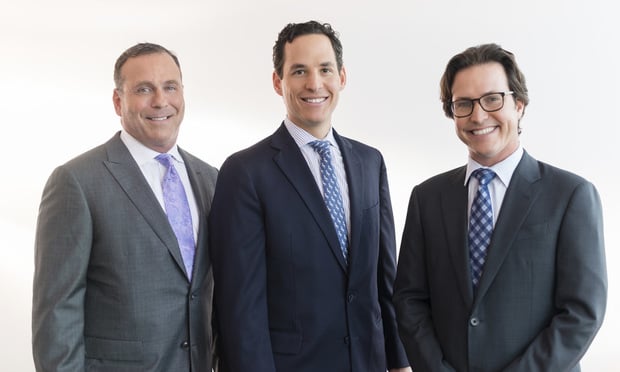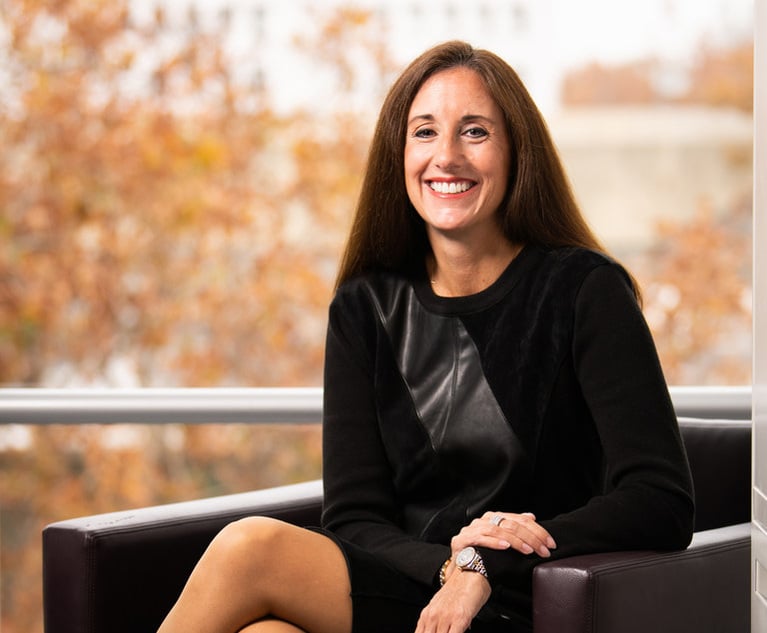Mark Migdal Bills Itself as a Different Kind of Litigation Boutique
The nine-attorney Miami law firm offers an "appreciation of our client's real business issues, fee arrangements, substantive work, culture, technology and branding" and promises to give its professionals greater control over their careers.
September 26, 2019 at 09:00 AM
8 minute read
 From left :Don Hayden, Etan Mark and Josh Migdal , partners with Mark Migdal & Hayden. Courtesy photo
From left :Don Hayden, Etan Mark and Josh Migdal , partners with Mark Migdal & Hayden. Courtesy photo
Mark Migdal & Hayden was formed with the goal of realigning the practice of law with client expectations in a truly upstart sort of way.
The 2-year-old law firm is very serious about litigation and placed its office in Miami's upscale high-rise Brickell Financial District. But its website illustrates in many ways how the office and its attorneys are far from the professional lockstep.
The "About Us" section segues to "Life in our office" and shows a pop-culture book collection rather than a law library, an animated alligator labeled "alligator litigator ping pong," a dart game, aquarium, orchid and other images above a gray-and-black banner reading "law realigned."
Highlights from the attorney bios include decidedly nonlaw references to the firm's best golfer (under 120), Barbra Streisand, questionably legal fireworks and paella.
That sets the stage for a firm offering clients "a relationship with their counsel that they don't dread."
The founding partners spent time at Baker McKenzie; Weil, Gotshal & Manges; Berger Singerman and Stolzenberg Gelles Flynn & Arango, a Miami commercial firm. Now they do things a bit differently.
Firm: Mark Migdal & Hayden
Name partners: Etan Mark, Josh Migdal and Don Hayden
Head count: To borrow a Talmudic saying, our success is not found "in something that has been weighed, nor in something that has been measured, nor in something that has been counted, only in something that is hidden from the eyes." So we don't like to think of ourselves in terms of "head count." But if you really want an answer, 13 (nine attorneys and four support staff members).
Location: Miami
Practice areas: Complex commercial litigation, international disputes and arbitration, and construction/real estate litigation
Governance structure and compensation model: As Steve Jobs wisely noted, "It doesn't make sense to hire smart people and tell them what to do; we hire smart people so they can tell us what to do." One reason that we insist that each of our attorneys has significant experience is so that we can govern collectively. Everyone has input regarding hiring decisions, the technological direction of the firm, and our business development and marketing strategy. Compensation is primarily focused on providing everyone with a share of the firm's success. We strive to offer an opportunity for attorneys to bet on the business and themselves in their compensation model.
Do you offer alternative fee arrangements? Yes. Our firm is built on the premise of realigning the practice of law, and we try to practice what we preach instead of offering clients an illusion of collaboration. We are happy to absorb risk on behalf of our clients and believe that doing so provides more natural incentives to encourage our attorneys to work better and smarter. At the moment, we probably have a dozen different fee arrangements on our commercial litigation matters ranging from pure contingency to pure hourly to everything in between. This includes monthly flat fees, monthly "not to exceeds," collars and blended fee arrangements.
What do you view as the two biggest opportunities for your firm, and what are the two biggest threats? As the legal marketplace in Miami continues to evolve, our greatest opportunity is creating a new generation of law firms in Miami. We believe that the time is ripe to connect with our community's business leaders and entrepreneurs in a genuine, service-oriented way. Clients are often disillusioned from their prior experiences with their attorneys. Our goal is to provide them with a breath of fresh air — a relationship with their counsel that they don't dread, but that they appreciate. The execution of this opportunity permeates everything we do — a focus and appreciation of our client's real business issues, fee arrangements, substantive work, culture, technology and branding.
Another opportunity is our ability to start from a clean slate. Our lack of institutional history presents us with an exciting ability to burn the model down and rebuild it brick by brick (or byte by byte) in the way that optimizes our performance and results for our clients. Even better, we try to do this in a way that involves our entire team, embracing the diversity of opinions so that everyone has a voice in helping us build a firm we think is pretty special.
We know this is going to sound theatrical, but one of the biggest threats to our firm — and every business looking to grow in Miami — is climate change. We are in the crosshairs. You don't need to be a meteorologist to see it. If there is no Miami in 50-100 years from now, there is no need to build a multi-generational law firm. If we love this city and we want it to be viable for our grandchildren, we need to develop the collective will to act. A secondary threat is the retention and election of excellent judges in our state judiciary. We underpay our public servants, have too few judges, fail to maintain courthouses and attorneys refuse to hold each other to the highest standards of professionalism. Then clients complain when they can't get a hearing date for three months. We need to focus on electing outstanding people to sit on the bench and supporting our excellent jurists.
The legal market is so competitive now — what trends do you see, and has anything, including alternative service providers, altered your approach? Is your chief competition other mid-market firms, or is your firm competing against big firms for the same work? With some exceptions, clients are no longer starstruck by the name of a law firm. Experience has taught clients that great attorneys are great attorneys, and the firm that is standing behind that attorney can be just as much of a hindrance as an advantage. Sometimes it takes a client getting his/her clock cleaned by a smaller player to be awakened to that reality. Technology has allowed smaller, nimbler firms to achieve some incredible advantages in litigation. We have not observed a specific trend in our competition. Sometimes we are pitching against a multinational behemoth, and sometimes we are pitching against a solo practitioner. In every pitch, we work hard to differentiate our approach and our product.
There is much debate around how law firms can foster the next generation of legal talent. What advantages and disadvantages do small and midsize firms have in attracting and retaining young lawyers, particularly millennials? Midsize firms are at a disadvantage when it comes to attracting young attorneys because they — particularly prospective litigators — come out of law school with the impression that they need to work for a large law firm. They are attracted by perceived prestige, misconceptions about compensation and the on-paper sexiness of matters. But we have an advantage in retention. At our firm, attorneys have so much more control over their careers. They drive the strategic direction of the firm, they substantively engage in cases, they are encouraged to develop their own book of business, and they are compensated in a transparent way that relates to their business development. Those young attorneys who are successful in this community thrive when given these types of opportunities; they are not keen to relinquish that control by moving to a more bureaucratic law firm. It also trains attorneys on developing a more entrepreneurial mindset (or sechel as my grandfather would say), which we believe translates to better client service.
Does your firm employ any nonlawyer professionals in high- level positions (e.g. COO, business development officer, chief strategy officer, etc.)? If so, why is it advantageous to have a nonlawyer in that role? If not, have you considered hiring any? We use independent contractors for business development, branding and public relations. At this point in time, we believe that maintaining that relationship is advantageous because it ensures that they have the pulse of the market, constantly looking for ways to adapt and be creative.
What would you say is the most innovative thing your firm has done recently, whether it be technology advancements, internal operations, how you work with clients, etc.? Innovation implies something that no one else is doing. We can talk all day about our customer relationship management, embrace of technology, branding, alternative fee arrangements and our efforts to build a culture of true collaboration. We recently offered a client a time-based alternative fee arrangement, which offers success payments depending on the outcome of a litigation that decreases over time. We are certain other firms have the same offering (we just don't know of any). Every day, we commit to not resting on our laurels, continuing to innovate and aggressive self-improvement.
Does your firm have a succession plan in place? If so, what challenges do you face in trying to execute that plan? If you don't currently have a plan, is it an issue your firm is thinking about? Not yet. We are still focused on continued success and smart growth — then we'll pivot to succession.
This content has been archived. It is available through our partners, LexisNexis® and Bloomberg Law.
To view this content, please continue to their sites.
Not a Lexis Subscriber?
Subscribe Now
Not a Bloomberg Law Subscriber?
Subscribe Now
NOT FOR REPRINT
© 2025 ALM Global, LLC, All Rights Reserved. Request academic re-use from www.copyright.com. All other uses, submit a request to [email protected]. For more information visit Asset & Logo Licensing.
You Might Like
View All

EB-5 Rebounds After a Rocky Year: Challenges of 2024 Lay Groundwork for a Booming 2025

Are Counsel Ranks Getting 'Squeezed' as Nonequity and Associate Pay Grows?
5 minute readTrending Stories
Who Got The Work
J. Brugh Lower of Gibbons has entered an appearance for industrial equipment supplier Devco Corporation in a pending trademark infringement lawsuit. The suit, accusing the defendant of selling knock-off Graco products, was filed Dec. 18 in New Jersey District Court by Rivkin Radler on behalf of Graco Inc. and Graco Minnesota. The case, assigned to U.S. District Judge Zahid N. Quraishi, is 3:24-cv-11294, Graco Inc. et al v. Devco Corporation.
Who Got The Work
Rebecca Maller-Stein and Kent A. Yalowitz of Arnold & Porter Kaye Scholer have entered their appearances for Hanaco Venture Capital and its executives, Lior Prosor and David Frankel, in a pending securities lawsuit. The action, filed on Dec. 24 in New York Southern District Court by Zell, Aron & Co. on behalf of Goldeneye Advisors, accuses the defendants of negligently and fraudulently managing the plaintiff's $1 million investment. The case, assigned to U.S. District Judge Vernon S. Broderick, is 1:24-cv-09918, Goldeneye Advisors, LLC v. Hanaco Venture Capital, Ltd. et al.
Who Got The Work
Attorneys from A&O Shearman has stepped in as defense counsel for Toronto-Dominion Bank and other defendants in a pending securities class action. The suit, filed Dec. 11 in New York Southern District Court by Bleichmar Fonti & Auld, accuses the defendants of concealing the bank's 'pervasive' deficiencies in regards to its compliance with the Bank Secrecy Act and the quality of its anti-money laundering controls. The case, assigned to U.S. District Judge Arun Subramanian, is 1:24-cv-09445, Gonzalez v. The Toronto-Dominion Bank et al.
Who Got The Work
Crown Castle International, a Pennsylvania company providing shared communications infrastructure, has turned to Luke D. Wolf of Gordon Rees Scully Mansukhani to fend off a pending breach-of-contract lawsuit. The court action, filed Nov. 25 in Michigan Eastern District Court by Hooper Hathaway PC on behalf of The Town Residences LLC, accuses Crown Castle of failing to transfer approximately $30,000 in utility payments from T-Mobile in breach of a roof-top lease and assignment agreement. The case, assigned to U.S. District Judge Susan K. Declercq, is 2:24-cv-13131, The Town Residences LLC v. T-Mobile US, Inc. et al.
Who Got The Work
Wilfred P. Coronato and Daniel M. Schwartz of McCarter & English have stepped in as defense counsel to Electrolux Home Products Inc. in a pending product liability lawsuit. The court action, filed Nov. 26 in New York Eastern District Court by Poulos Lopiccolo PC and Nagel Rice LLP on behalf of David Stern, alleges that the defendant's refrigerators’ drawers and shelving repeatedly break and fall apart within months after purchase. The case, assigned to U.S. District Judge Joan M. Azrack, is 2:24-cv-08204, Stern v. Electrolux Home Products, Inc.
Featured Firms
Law Offices of Gary Martin Hays & Associates, P.C.
(470) 294-1674
Law Offices of Mark E. Salomone
(857) 444-6468
Smith & Hassler
(713) 739-1250







